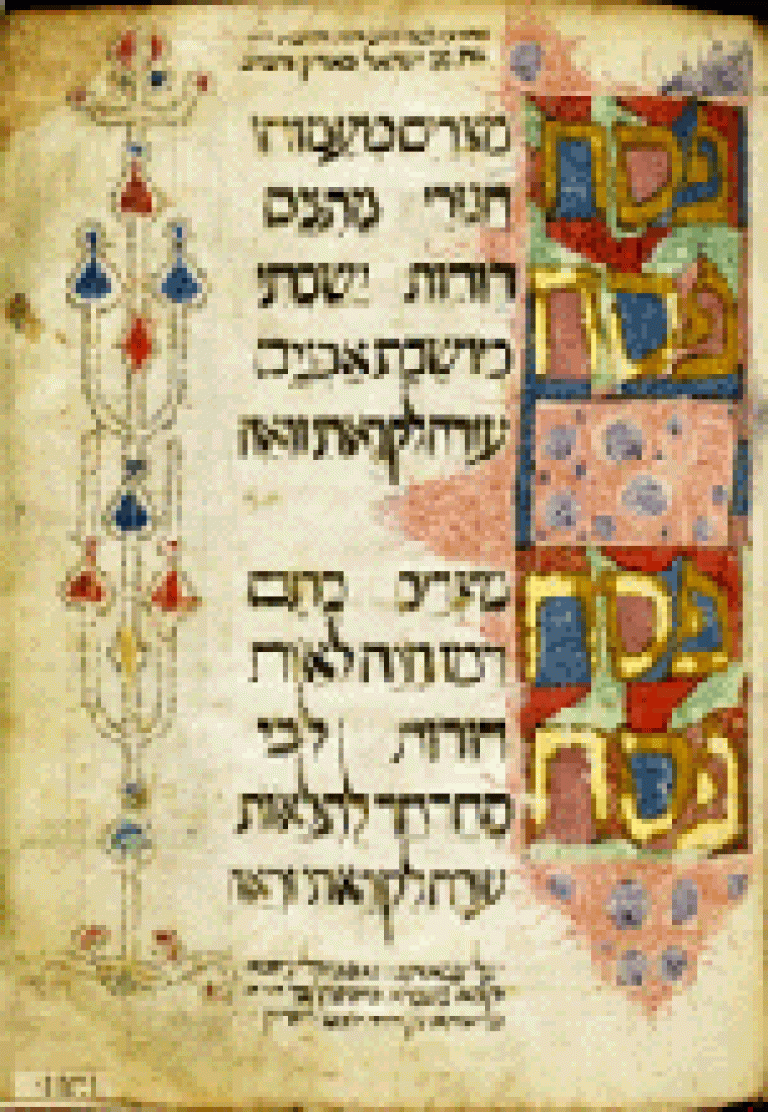Remember the Days of Old
9 October 2006
If you are visiting the UCL Main Library to snag the key book on the reading list, to do a spot of research, or simply to shelter from the hustle and bustle of Gower Street, pause for a moment halfway up the stairs.
 Here, a modest display case tells the story of UCL's long and groundbreaking connection with the Anglo-Jewish community in the UK.
Here, a modest display case tells the story of UCL's long and groundbreaking connection with the Anglo-Jewish community in the UK.
Delicate filigree spice boxes, painstakingly painted Hebrew texts, an early phrase book and sepia images of austere pillars of the community have been brought out from the darkness of the UCL Library Services Special Collections vaults to commemorate two anniversaries this year: 100 years since the Mocatta Collection came into the care of UCL, and 350 years since Jews were readmitted to Britain.
Frederic Mocatta was a 19th century London benefactor and patron of the arts who spent his life acquiring a library of phenomenal breadth. On his death, he left his entire collection to the Jewish Historical Society of England, which found it a permanent home a year later at UCL.
Mocatta's ancestors had been forced out of Spain by Ferdinand and Isabella's expulsion of Jews in 1492. He became a great scholar and community leader, devoted to supporting Jewish learning and spreading knowledge of Judaism and Jewish history. However, the fragment of a one-foot tall illuminated Qur'an bears witness to his wide-ranging interests. The volumes Mocatta collected form the nucleus of UCL's holdings, which at over 500,000 items represent one of the largest and most comprehensive collection of Anglo-Jewish research material in a UK university.
Silverware used in religious rituals are some of the most intriguing items on display: 'yads' - pointers topped with tiny hands - were used to keep one's place in sacred, untouchable texts, while the miniature cylindrical binders probably protected travellers' Torah scrolls while they were on the road.
According to Susan Stead of UCL Special Collections, some of the most unusual and popular items are the incunabula - the large, beautifully illustrated tomes that are over 400 years old. They are also extremely rare: very few printed Hebrew texts appeared before 1500. The unique handwritten Mocatta Haggadah manuscript is a highlight: a set of biblical passages that were used in Passover services, probably in northern Spain, dating back to the late 13th century. It depicts the preparations for the Passover holiday and features grotesque figures leering from the edges of the text.
"This collection is quite unique," says Liz Chapman, Deputy Director of UCL Library Services. "Other universities tend to have Jewish or Hebrew materials that are more archival in nature, whereas ours portray all aspects of life in the 19th century Anglo-Jewish community."
Indeed, the fraction of the holdings on display include a proto-pocket Hebrew-English phrasebook, 'Elements of the Hebrew Language', listing translations for 'fear and piety' alongside more prosaic entries such as 'a sieve' and 'green herbs'. It was written by Hyman Hurwitz, appointed in 1828 as UCL's first Professor of Hebrew, thereby becoming the first professing Jew to hold a university chair (UCL was also the first university in the UK to open its doors to Jewish students).
A vast array of pamphlets - marriage services, concert invitations and Kosher food notices among them - give a picture of the various concerns and interests of Jewish people resident in the UK over the centuries. They are some of the most recent additions to the collection, but some of the oldest artefacts.
The multi-faceted nature of the holdings made the collection an apt backdrop for Sir Martin Gilbert, leading historian and Winston Churchill's official biographer, to interview the Chief Rabbi for "In A Strange Land", a BBC One programme on the integration of the Jewish community in the UK aired on 20 September this year.
The impressive range of the materials is all the more surprising given the loss of most of the collection during the Blitz. After the Second World War, a concerted effort was made to create a collection that would rival the first. It now encompasses items from the philanthropist Sir Moses Montefiore, Dr Moses Gaster (Chief Rabbi of the Spanish and Portuguese community in England, 1887-1918), Sir Hermann Gollancz (a former Chair of Hebrew at UCL), Israel Abrahams, the distinguished Jewish scholar, and Lucien Wolf - a journalist and diplomat who co-designed the Minorities Treaties after the First World War which set the framework for the rights of European Jews.
Given its turbulent history, it's no surprise that digitisation is on the horizon for the collection. Liz believes it won't just protect the holdings for future generations, but will boost visitor figures. "I'm sure that there will be a 'virtuous circle' effect," she explains. "Once researchers see the range and quality of what we have here, requests to visit the collections in person are bound to rise. And the online catalogue will act as a useful aide-memoire when they need to refer back to what they have seen."
The objects are destined for a new physical home too: the UCL Institute for Cultural Heritage will have a greater capacity to display more of the collection, all of the time. Both developments will serve to safeguard a collection whose careful preservation and reconstruction is significant in social, historical, economic and academic terms.
'Remember the Days of Old: Celebrating Jewish Connections' will be on display in the UCL Main Library until the end of the first week of December 2006.
Image 1: The Mocatta Haggadah manuscript, dating from the 13th century
Image 2: Spiceboxes and other ritual silverware
Image 3: Members of the Mocatta family and other guests celebrate the opening of the exhibition in the Flaxman Gallery
 Close
Close

